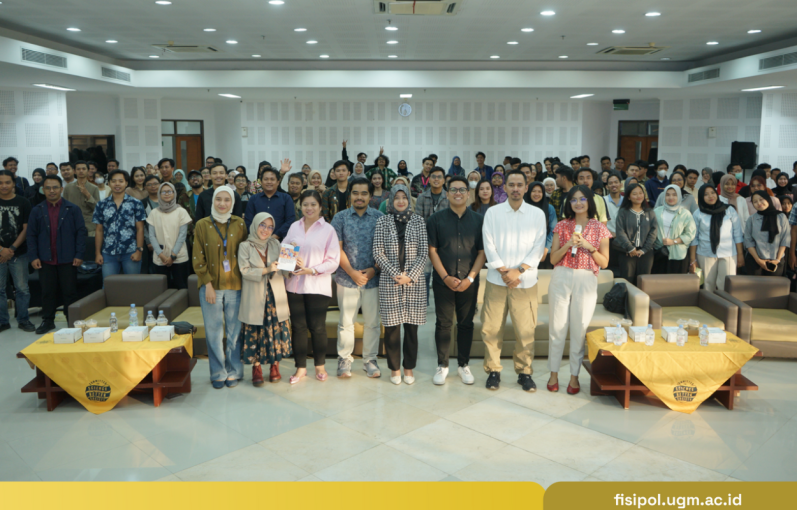
Yogyakarta, 29 August 2024–The 2024 election contest provides a stark illustration of how national politics has been reshaped by technological advancements. The visible rise of societal polarization, a direct result of digital media, has prompted immediate action. Recognizing the urgency of the situation, the UGM Center for Digital Society (CfDS) has taken a proactive step by inviting the Association for Elections and Democracy (Perkumpulan untuk Pemilu dan Demokrasi/ Perludem), the Indonesian Anti-Defamation Society (Masyarakat Antifitnah Indonesia/ Mafindo), and the Election Supervisory Body (Badan Pengawas Pemilu/ Bawaslu) to join forces on Thursday (29/8).
In the Desus #15 series, ‘Mutual Cooperation Against Election Disinformation: Multiparty Efforts in Indonesia,’ Iradat Wirid underscored the coalition’s collaborative nature. He stated that the coalition was formed not to combat a flood of information and hoaxes during the election alone, but as a united front. “Misinformation is created deliberately, mass-produced, and corporate to spread to the public. This coalition is a testament to our collective progress and commitment to collaboration,” he explained.
According to Iradat, it is almost impossible to prevent or eliminate the spread of hoaxes in the current era of information flooding. The formation of the coalition began with concerns about uncontrolled misinformation and hoaxes. In the 2024 election, the intensity of hoaxes will increase but with higher public immunity. The hope is that forming the coalition will make society itself a fence for misinformation.
The most highlighted impact of hoaxes is the 2019 election. The spread of hoaxes causes polarisation in society and even the voter suppressor phenomenon, which is intimidating and threatening. Perludem also noted the many hoaxes surrounding the voting technicalities, the required documents that must be brought, and voting times. This anti-hoax coalition is designed so that every agency and organization with different functions can work together to overcome the spread of hoaxes in society.
“Following up on this problem, Perludem initiated the formation of multi-party collaboration in handling election disinformation,” said Perludem researcher, Heroik Pratama. This coalition was specifically initiated with the name “Civil Society Coalition Against Election Disinformation”. The coalition’s central vision and mission is to create a democratic digital ecosystem and strengthen the ability to uncover election disinformation.
Looking at the 2024 Election, the public was worried about hoaxes and misinformation related to SIREKAP. The recapitulation system has been widely accused of being manipulated by election organisers. As a result, public confidence in implementing elections in Indonesia has decreased drastically. “We believe that there is interference that causes public trust to decline. Another challenge for us is the lack of responsiveness of our election organisers,” added Pratama.
Unfortunately, the government has not taken firm action against the spread of hoaxes and misinformation. Many anti-hoax movements have emerged organically in society. Septiaji Eko Nugroho, Co-Founder of Mafindo, explained that resolving hoaxes requires multi-sector collaboration. Mafindo itself was first formed on the Facebook anti-hoax forum. Thanks to the collaboration with Bawaslu, the Ministry, and even Google Indonesia, Mafindo is now one of the largest non-profit organisations that helps fight hoaxes.
“From the experience of 2019, approaching 2024, we have to do something different. Efforts to fight misinformation cannot be done alone. It must be done inclusively,” said Septiaji. Collaboration improves performance, joint commitment, and the effectiveness of targets and achievements. Coalitions make joint power more meaningful and impactful than working alone.
In line with this opinion, Ummi Illiyina, Chairperson of the Bawaslu for the Special Region of Yogyakarta, revealed that Yogyakarta is the second largest area for spreading national hoaxes and misinformation. The most common hoaxes are attacks on the government and election organisers. The Bawaslu Team has taken steps to prevent the spread of hoaxes several times, one of which is collaborating with META, Tiktok, Kominfo, and civil organisations such as Mafindo.
“Most of the time, we found that the government was attacked. The danger is, no matter how well the election organisers do their job, the results will still lack public trust,” said Ummi. He admitted that the current election campaign trend is shifting to more vulnerable digital spaces. Bawaslu also routinely evaluates hoax eradication strategies. Even now, Bawaslu is also embracing national influencers to participate in countering hoaxes spread on social media.
The idea of an anti-hoax coalition can later strengthen the combined forces to eradicate hoaxes. The hope is that a digital environment and society will be subjected to hoaxes and misinformation.
